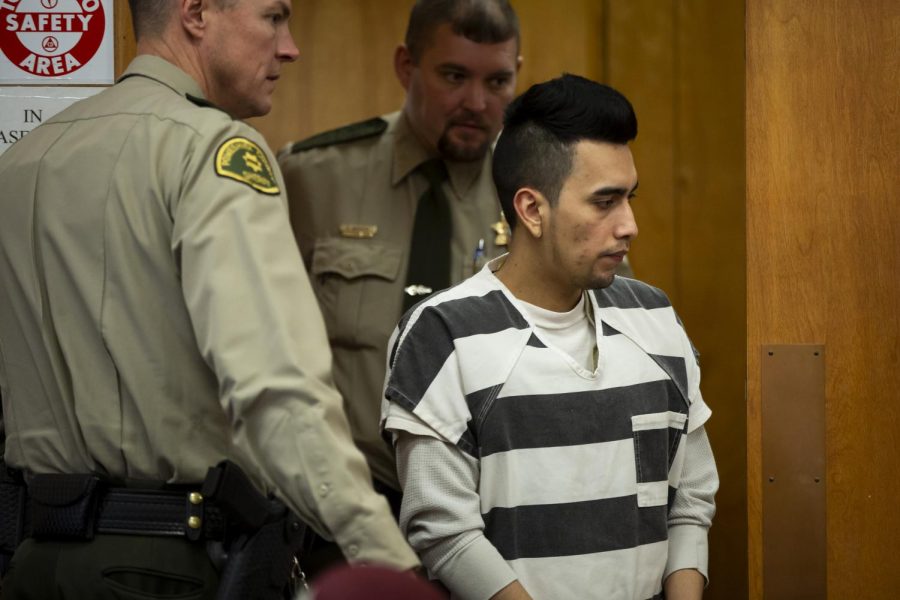Judge rules to allow key evidence to be used in Mollie Tibbetts trial
An 8th District Court judge ruled Monday that most evidence can be used in trial, including the discovery of Tibbetts’ body and blood in the defendant’s car.
Cristhian Bahena Rivera appears for an evidence suppression hearing at the Poweshiek County Courthouse on Wednesday, Nov. 13, 2019 in Montezuma. Brian Powers/The Register
December 23, 2019
A judge on Dec. 23 ruled that most evidence against the man accused of slaying University of Iowa student Mollie Tibbetts may be used in trial, rejecting defense claims that he involuntarily made incriminating statements during questioning by law enforcement.
Eighth District Judge Joel Yates in records filed Dec. 23 ruled that testimonial evidence obtained from the defendant, Cristhian Bahena Rivera, from the time he was read his Miranda Rights improperly Aug. 20, 2018, until around six hours later Aug. 21, 2018, cannot be used in trial.
Yates also determined that statements Bahena Rivera made during questioning by law enforcement were voluntary despite his claim of a lengthy interrogation while sleep-deprived. Yates also disagreed with his claims that his Miranda Rights were violated. Statements made following the reading of his rights and physical evidence gathered from those statements may be used in court, according to the filings.
The ruling allows prosecutors to use blood evidence found in the trunk of Bahena Rivera’s vehicle, which they say matches Tibbetts’ DNA, as well as the discovery of Tibbetts’ body as evidence in trial.
RELATED: Witnesses testify at evidence-suppression hearing for the man accused of killing Mollie Tibbetts
Yates’ ruling comes after a two-day hearing in November at the Poweshiek County Courthouse on whether certain evidence — including authorities’ discovery of Tibbetts’ blood in Bahena Rivera’s vehicle and the location of her body — can be used against Bahena Rivera in trial.
Tibbetts disappeared July 18, 2018, while on a run in her hometown of Brooklyn, Iowa. The 20-year-old was found dead in a cornfield in rural Poweshiek County Aug. 21, 2018, after authorities said Bahena Rivera, then 24, led them to her body. An autopsy showed she died from “multiple sharp-force injuries.”
Defense attorneys Chad and Jennifer Frese filed a motion in March seeking to suppress some evidence in trial, describing Bahena Rivera’s limited knowledge of the English language and his lack of education. He is an undocumented Mexican immigrant who came to the U.S. at age 17 with some education from the high school in Brooklyn and completion of nine grades of school in Mexico, according to Monday’s filings.
Additionally, the defense claimed authorities induced a false confession from Bahena Rivera by offering promissory leniency and contended that he did not voluntarily make certain statements. Two law-enforcement officials testified that he appeared engaged during questioning, which Yates said video supports in the filings.
RELATED: Man accused of killing Mollie Tibbetts did not testify on second day of evidence-suppression hearing
Yates also wrote that, in addition to Bahena Rivera’s voluntary statements, he consented to a search of his vehicle. A consent form provided to him in Spanish informed Bahena Rivera that he had the right to refuse a search of the vehicle.
Because Bahena Rivera was informed of his rights and the consequences of abandoning them, and because Yates determined he had made the choice to abandon his rights free from coercion, Yates wrote that Bahena Rivera “knowingly, intelligently, and voluntarily waived his Miranda rights.”
Bahena Rivera’s trial is set to begin Feb. 4, 2020, in Woodbury County. If convicted of first-degree murder, he faces life in prison.



